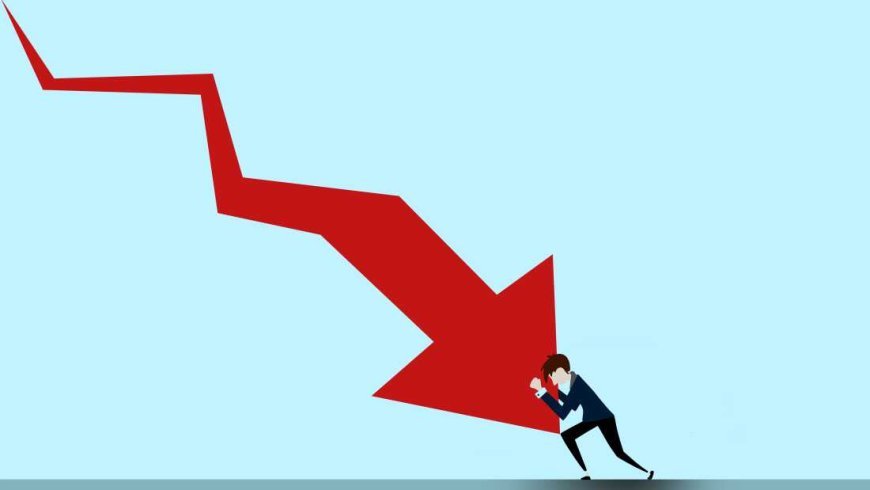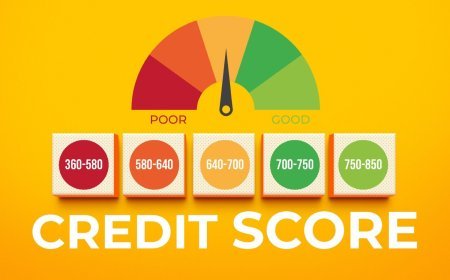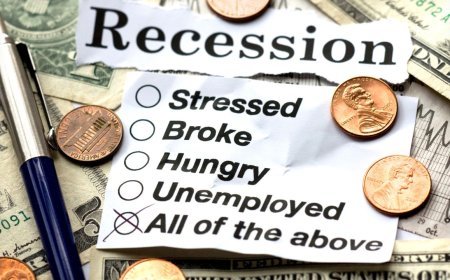How to Prepare for a Recession Financially: Smart Strategies for Tough Times
As economic uncertainty looms, many people start to worry about their financial future. Preparing for a recession can feel overwhelming, but it doesn't have to be.

As economic uncertainty looms, many people start to worry about their financial future. Preparing for a recession can feel overwhelming, but it doesn't have to be.
Taking steps to improve your personal finances now can help you feel more secure and confident during tough times.
Building an emergency fund is one of the most effective ways to brace yourself for a potential downturn. Aim to save enough to cover three to six months of living expenses.
This cushion can ease your stress and allow you to focus on the challenges of an economic recession without the added worry of immediate financial strain.
Another way to prepare is to revisit your budget and prioritize essential expenses. By cutting back on non-essential spending, you can boost your savings and better position yourself against unpredictable shifts in consumer confidence.
Taking these proactive steps can make a big difference, helping you navigate any financial hurdles that may come your way.
Understanding Recessions and Their Impact
Knowing about recessions can help you prepare better for financial challenges. This section covers what a recession is, how it has changed over time, and its effects on jobs and the economy.
What Is a Recession?
A recession is a period when the economy slows down. It usually lasts for at least six months and is marked by a decline in Gross Domestic Product (GDP). GDP measures the total value of goods and services produced in a country.
You might notice signs like falling consumer spending, business investment drops, and reduced incomes during a recession. These factors can lead to less overall economic activity. As a result, a recession affects many people and businesses, making it crucial to prepare.
Historical Economic Cycles
Economies go through cycles of growth and decline. Throughout history, there have been notable recessions, such as the Great Depression in the 1930s and the 2008 Financial Crisis. Each economic downturn has unique causes, like financial mismanagement or major events impacting the economy.
When studying past recessions, you will see patterns. For example, each recession leads to government actions aimed at recovery. These can include lowering interest rates or introducing stimulus packages to boost consumer spending.
Effects on Unemployment and GDP
During a recession, unemployment rates tend to rise. Many companies cut jobs to save costs, leading to financial stress for many families. Higher unemployment means less disposable income, which further slows economic growth.
GDP also declines during economic recessions. A drop in production and consumer spending leads to lower GDP. This creates a cycle where businesses see less revenue, prompting them to reduce hiring or lay off workers. The effects can ripple through the economy, impacting various sectors and communities.
Creating a Robust Financial Plan
A solid financial plan helps you navigate through tough economic times. It involves understanding your current situation, setting clear goals, and seeking professional advice to strengthen your finances.
Assessing Your Financial Health
Start by taking a close look at your financial situation. List your monthly income and all your expenses to see how your cash flow looks. This will help you identify areas where you can cut back.
Review your debts as well. Knowing what you owe and the interest rates on each debt is crucial. You might find it helpful to create a simple table to track these.
Additionally, assess your savings. Make sure you have at least three to six months’ worth of living expenses saved in an emergency fund. This fund will act as a buffer during tough times.
Setting Financial Goals
Once you know your financial health, it’s time to set specific goals. Think about what you want to achieve in the short and long term.
For example, you might want to pay off a specific debt, save for a vacation, or build your emergency fund. Write these goals down and make them measurable.
You can create a budget that aligns with these goals. Prioritizing your spending can help you focus on what matters most. Using budgeting apps or spreadsheets can keep you organized.
Consulting a Financial Advisor
After establishing your plan, consider talking to a financial advisor. They can offer personalized advice tailored to your needs. This can be especially helpful if you feel overwhelmed by complex decisions.
A good advisor will help you navigate options like investments, retirement savings, and debt repayment strategies. Make sure to choose someone who understands your situation and offers clear guidance.
Having professional support can help you stay on track with your financial goals and adapt your plan as needed. It’s an investment in your financial future.
Strategies for Budgeting and Saving
Effective budgeting and saving strategies are essential for managing your finances, especially during tough economic times. By focusing on trimming unnecessary expenses, prioritizing debt repayment, and building an emergency fund, you can safeguard your financial health.
Trimming Discretionary Spending
To start, identify areas where you can cut back. Discretionary spending includes non-essential items like dining out, entertainment, and shopping.
Tips to reduce costs:
- Create a list of essential vs. non-essential expenses.
- Set a monthly limit for discretionary spending.
- Look for free or low-cost activities for entertainment.
Use budgeting apps to track your spending. Visual reminders, like a monthly budget chart, can keep you motivated to stick to your limits. Even small changes can add up over time, allowing you to divert more funds into savings.
Prioritizing Debt Repayment
Debt can weigh heavily on your finances. Focus on paying off high-interest debts first, like credit cards. This strategy reduces the total amount of interest you pay over time.
Steps for effective debt repayment:
- List all your debts with interest rates.
- Consider the snowball method: start with smaller debts for psychological wins.
- Make extra payments whenever possible.
By prioritizing debt repayment, you free up money for other expenses and savings. Reducing debt gives you more flexibility during uncertain times and improves your financial stability.
Building an Emergency Fund
An emergency fund is your safety net. Aim to save enough to cover three to six months of living expenses. This cushion helps you manage unexpected costs without relying on credit.
Building your fund can include:
- Setting up a separate savings account for easy access.
- Automating transfers from your checking to savings account.
- Starting with small, regular contributions.
Even a little saved each month can grow significantly over time. Your emergency fund provides peace of mind, ensuring that you’re prepared for whatever comes your way.
Navigating Investments During Market Volatility
During times of market uncertainty, it's essential to understand how to manage your investments effectively. You can take specific steps to protect your assets and make informed choices.
Stock Market Basics
Start by learning how the stock market works. Stocks represent ownership in companies, and their prices fluctuate based on many factors like interest rates and inflation. When interest rates rise, borrowing costs increase, which can slow down spending and hurt profits.
Watch for economic indicators, such as market trends and consumer confidence. Keeping an eye on these factors can help you anticipate changes in stock prices. This knowledge allows you to make smarter investment decisions.
Diversification Strategies
Diversification is crucial for reducing risk. By spreading your investments across different asset types, such as stocks, bonds, and real estate, you can protect yourself against market downturns.
Consider a mix of industries too. If one sector struggles, others may thrive. For example:
- Technology: Often volatile but high-growth potential.
- Utilities: Usually stable and can provide dividends.
Using index funds or ETFs can help you diversify with ease. These funds track a market index, giving you exposure to many companies without the need for extensive research.
Long-Term Investment Planning
Long-term planning is key when facing market volatility. Instead of reacting to daily market changes, focus on your goals. Determine how much you need to save for retirement or other financial milestones.
Aim to invest regularly, setting aside money each month, regardless of market conditions. This strategy, called dollar-cost averaging, can lower your risk. When prices drop, you buy more shares; when they rise, you buy fewer.
Keep your emotions in check. Avoid panic-selling during downturns. Often, markets recover over time, and staying invested can lead to better outcomes in the long run.
Preparing for the Worst-Case Scenario
When facing a recession, it's important to get ready for potential challenges like job loss and financial strain. You can take specific steps to protect yourself and your finances during tough times.
Job Loss Preparedness
To prepare for possible job loss, start by building an emergency fund. Aim to save enough to cover three to six months of living expenses. This safety net can help you manage bills while you look for new work.
Next, update your resume and LinkedIn profile. Keep your skills sharp by taking online courses relevant to your field. Networking is also key; connect with former colleagues or attend industry events, as many job openings come through referrals.
Having a side hustle can also provide extra income if you face sudden unemployment. Consider freelance work, part-time jobs, or selling items you no longer need.
Managing a Mortgage During a Recession
If you have a mortgage, prepare for financial challenges that may arise. Keep track of your mortgage payments and consider refinancing if interest rates drop. This could lower your monthly payments and ease your financial burden.
Talk to your lender about options, such as forbearance or loan modifications, if you struggle to make payments. Making timely payments protects your credit score, which is crucial for future financial decisions.
Lastly, review your budget. Identify areas to cut back on expenses. This might help you allocate more funds toward your mortgage during hard times.
Reducing High-Interest Debt
High-interest debt can become a real problem during a recession. Focus on paying down debts like credit cards that have high interest rates.
Start with the highest interest rate debt first. Then, make minimum payments on others.
Consider consolidating your debts to reduce interest rates. You could take out a personal loan at a lower rate to pay off high-interest debts. This move can save you money in the long run.
Avoid taking on new debt during this time. Use cash or debit cards instead of credit cards, which helps you stick to your budget.
Reducing your debt will give you more financial freedom if a worst-case scenario hits.
What's Your Reaction?
 Like
0
Like
0
 Dislike
0
Dislike
0
 Love
0
Love
0
 Funny
0
Funny
0
 Angry
0
Angry
0
 Sad
0
Sad
0
 Wow
0
Wow
0














































